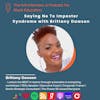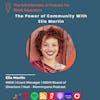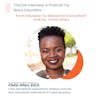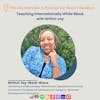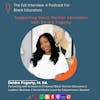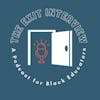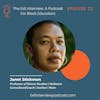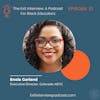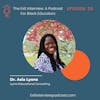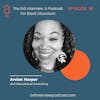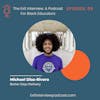
"So...How's Work?" with Janet Stickmon
Janet Stickmon received the McPherson Distinguished Teaching Award at Napa Valley College. She takes great pride in working with her students. She has created CenterJoyPWR®: Strategies for Healing Racial Battle Fatigue—an online experience for professionals of color who want to center joy in their lives. But before this Janet was a Catholic school educator with a strong desire to teach ethnic studies. Listen as Janet shares her story along with fantastic strategies that school districts and universities should implement to retain Black educators.

- 60% discount for special guided six-week summer program
- June 12, 2023 to July 21, 2023
- Enroll by June 12 and have access to weekly 1-hour live virtual group coaching sessions, Wednesdays 6pm PST / 9pm EST during program
- Are a professional of color who wants to reconnect with joy.
- Feel emotionally, physically, and/or spiritually drained.
- Notice changes in your mental and physical health as a result of racism-related stress.
- Need a space where you can be vulnerable.
- Are better at nurturing others than nurturing yourself.
- Sometimes feel guilty about experiencing joy.
- Often worry about your safety and well-being.
- Are looking for a space that recognizes how systems of oppression impact self-care.
First of all.... have you signed up for our newsletter, Black Educators, Be Well? Why wait?
Amidst all the conversations about recruiting Black educators, where are the discussions about retention? The Exit Interview podcast was created to elevate the stories of Black educators who have been pushed out of the classroom and central office while experiencing racism-related stress and racial battle fatigue.
The Exit Interview Podcast is for current and former Black educators. It is also for school districts, teachers' unions, families, and others interested in better understanding the challenges of retaining Black people in education.
Please enjoy the episode.
Peace out,
Dr. Asia Lyons and Kevin Adams
Janet Stickmon: [00:00:00] We should be treating them as. Full whole human beings recognizing the wholeness, the completeness of their humanity. And this was something that I definitely struggled with, at a Catholic school that I had a dress code and, wanted to , enforce the dress code, but often at times it would there would be greater emphasis on paying attention to whether or not a student was following the dress code as opposed to the condition of their spirit.
Introduction: Amidst all of the conversation about recruiting black educators, where other discussions about retention, the Exit Interview podcast was created to elevate the stories of black teachers, professors, counselors, social workers, and administrators who have been pushed out of the traditional education space.
My co-host Kevin Adams, me, Dr. Asia Lyons, are on a mission with our guests to inform school districts, teachers, unions, families, students, educators, and others, [00:01:00] interested in understanding the challenges of retaining black people in education. Welcome to the Exit Interview: A Podcast for Black Educators.
Dr. Asia Lyons: Welcome back to episode 22 of the Exit Interview: A Podcast for Black Educators. I'm your host, Dr. Asia Lyons, and my co-host Kevin, is nowhere to be found. So my guest and I have to go on without him but we wish him luck wherever he is. I'm here today with Janet Stickmon and I'm really excited to hear her story for you all to hear her story.
And so we're just gonna jump right in. Thank you so much for coming on our podcast today, Janet.
Janet Stickmon: Oh, thank you so much Asia, for having me.
Dr. Asia Lyons: Yeah, so to start off, first things first is, Tell us about your story, your journey into education. What made you decide to be an educator? Was it from childhood? Something you figured out later on in life? Tell us your story.
Janet Stickmon: My story is [00:02:00] somewhat checkerboarded. I actually didn't set out to be an educator. I feel like teaching found me. I did my undergrad in civil engineering at UC, Irvine. And I actually started off as a math major and it was one of those things where I ended up taking, I loved math, but I took, I found myself taking a class where I had to prove that zero didn't equal one.
And I was like no, I think I need something a little more practical. So I found my way into civil engineering, loved it. And found an entry level structural engineering job. After I graduated, I worked there for about eight months and then I was laid off, the company went under I had to figure out, I had to figure out how to eat.
I had to figure out how to pay my rent. And what I did is back then I I took a look at the Yellow Pages and I just called all these Catholic schools. Cause I didn't have a [00:03:00] credential. I didn't have a teaching credential. So I called up the Catholic schools and said, Hey, are you looking for a math teacher?
Are you looking for a math teacher? And, I think there were the first few said, no, but we'll keep you in mind. And then I reached one that said they actually were looking for a math teacher. Their current teacher who taught fifth through eighth grade math had to go on. Had to get chemotherapy and they would need a teacher for the next six months.
And so I think I went in for an interview like the Thursday of one week, and I started working, I think around the Tuesday of the following week. It happened. It happened so fast. And that was how I ended up with my first official. Teaching gig.
Dr. Asia Lyons: Hold on, Janet. Hold on one second. Let's back up a little.
First of all, shout out to the yellow pages, right? Cause it's been a minute. Yeah. Since I've seen one. For those of us who've never seen Yellow Pages who are listening to the podcast, just go ahead and close up the podcast. We're not for you. Second of all the, I love like the relentlessness of saying I'm just gonna figure this out.
I'm just going to just keep calling and keep showing up until something happens, which, Mathematicians are puzzle solvers, right? It's like, how do we figure this out? As I used to, I was a math major too. It's like, how do we figure this out? The brain just keeps twisting it around.
Yeah. And so shout out for you for just keep showing up for yourself.
Janet Stickmon: Thank you. I really appreciate that. Yeah, that was, it was tough because I was trying to figure out how, I don't really have a backup plan. I didn't think that this company would go under.
I figured, okay, let me try teaching. And so I got the job and I taught part-time in fifth through eighth graders. And they won me over it. It was [00:05:00] the best experience of my life. It was probably the hardest as well. I think each day I taught for about three hours and it was exhausting.
I had to take a nap afterward because they, they were just, they were busy. They were busy. But they were great. And I had to figure out how do I take, this subject matter that I absolutely love and make it something that is that the students comprehend, but also see if we can make that love a bit contagious.
Yeah. I love that. And so I, I had so much fun and I didn't realize. It would have such a profound impact on me. And I decided during those six months that what I wanted to do was teach. But it was just a matter of what I wanted to teach cuz I couldn't picture myself teaching math for the rest of my life.
Or only math. And at the time I thought that I wanted to maybe teach theology. And [00:06:00] I moved on and got a master's in religion and Society. I packed up my bags and put everything in a U-Haul truck. This was in Southern California. Drove up here to the Bay and started my, my theology degree.
Or officially it's a religion in society at the Graduate Theological Union in Berkeley. And that was around 90, 19, 97 or so. And yeah, so I completed that degree, found a job at a Catholic school teaching math and religion. And the religion class was a combination of. One semester social justice and the other semester history of Christianity.
Dr. Asia Lyons: Just to let you know, I'm the queen of, let me pause you for a second, or like interrupting. So just know that about me. So a couple things. I'm curious to know, you went to school for civil engineering mathematics and you moved to civil engineering.
[00:07:00] Now, when you decided, okay, I'm gonna go and choose teaching, what was the conversation if there was any up with your family around you went to school to do this and now you're gonna do that, were there any kind of conversation or did folks just say as long as you're working, whatever makes you happy.
What did that look like?
Janet Stickmon: Thank you for that question. I actually was riding solo my parents passed away when I was a teenager. My mom passed away when I was 15 and my father passed away when I was 19. And by the time I graduated from college I was riding solo. And so any decisions that I had to make I didn't have to explain them to anyone.
And as much as I, most certainly, I would've loved to have my parents be there with me every step of the way and have that support and be able to bounce questions off of them and get their guidance, et cetera. I must say that's, there, there was something about the fact that [00:08:00] there was only the way forward.
I, yeah. I did not have to ask for anyone's permission. I didn't have to. Explain my decisions to anyone. I just had to check in with myself Yeah. To make sure that this was exactly what I wanted to do. And, and that was the tricky part. That was definitely the tricky part. I was trying to figure out if a particular path was the right path for me.
And I think I was led by faith in a lot of ways. And of course, the guidance of different mentors and asking them questions and so on Sure. And forth. And yeah I had quite a bit of experience doing Youth or not youth ministry campus ministry at uc, Irvine.
And I think that's where the theology the love for theology, Catholic theology developed. [00:09:00]
Dr. Asia Lyons: Okay, awesome. So now we're at the second Catholic school and we're teaching what again?
Janet Stickmon: I was teaching algebra to freshmen. And I was teaching social justice and history of Christianity to juniors.
Dr. Asia Lyons: Now the audience is going to wanna wrap their head around that conversation. So please help us with that. What did that look like? What did that feel like?
Janet Stickmon: It was, the first year was hard. The first year was hard, I have to admit. I remember talking to some colleagues of mine and they said, listen, Janet you never want to decide.
On whether or not teaching is going to be your lifelong career. You don't wanna decide that in your first year. Just know that first year will probably be a trash year, and it'll be hard, difficult, probably the worst experience of your life, but just wait until the second or third year before you.
And so I said, okay. And sure enough, that first year it was so [00:10:00] hard. I was scared to death. I remember sitting in my classroom and hearing my classroom was close to the stairwell, and as soon as the bell rang, I heard all the students come up the stair. Oh my goodness. My, my heart just started pounding and I was, yes.
And it took me a while to really figure out boundaries develop confidence as far as confidence in my own command of the material. And I, after maybe the first semester, I found a certain level of comfort and but nonetheless, it was really, it was extremely hard. I think that there was a certain earnestness that some of the students recognized in me.
Some of them would give me a hard time. Others would show up during break or lunch and ask me questions. Others, I think [00:11:00] it was a combination they enjoyed. They enjoyed teasing me, which was great and frustrating. I'll never, yeah I did have a, I had one student who removed the doorknobs from my door and he and I looked up, I was getting ready to leave the classroom.
I looked up, I was like, where are my doorknobs? And I see him at the back door through the window holding the doorknobs.
Dr. Asia Lyons: No, we need names. We need, give me this child's day. We need to put them out there. They're grown now.
Janet Stickmon: Jeff Williams. Jeff Williams.
Dr. Asia Lyons: Sir, I hope you became something that involved taking things apart and putting it back together.
Jeff Williams, we are shouting you out today on this podcast.
Janet Stickmon: I, it was moments like that helped me to stay in teaching, even though that first year was so difficult. I had I [00:12:00] recognized that as an act of love. Yes. Because if, if he hated me, he wouldn't put the doorknobs back on.
Dr. Asia Lyons: Exactly.
Janet Stickmon: Leave me sitting there. But in any case , I think it was around the second or third year that became clear to me that I had a passion for teaching. And it was clear to the students, and they responded to that passion, and they kept coming back and asking me questions. They kept on during class of being very vulnerable, especially in the social justice class.
We were able to talk about everything. Sure. And I think there was a certain comfort that they had with each other and with me and the kind of space that I would create for them that they weren't necessarily finding it in all of their classes there at the school.
And there were a couple that, they couple of other teachers they most certainly gravitated toward. But I, I definitely I was humbled by the kind of respect that I received from them.
Dr. Asia Lyons: Yeah. It's interesting that you're saying this because I taught, when I was teaching middle school, I taught sixth grade math and I taught social justice. Yeah, it's wild. It's wild. Cuz I did not know that when we first started talking and I, I felt like first I, by that time I had been teaching for maybe 10 or 11 years. Some in me elementary and some in middle. But the social justice class was that space. Yes. Where I just really felt like I connected with students and hopefully, I don't wanna assume, but they connected with me also.
And you're right, the questions they would ask, they would come back. I remember one of my students, she told me, she said, I was talking to my grandmother yesterday and she said something and I told her, grandma, you're being racist. And if she's looking at me like, are you proud of me? And I'm like, oh Lord, I'm about to get an email about this.
But granny never emailed. But yeah, that those connections, and I think for a lot of students it was a moment of you see me beyond [00:14:00] the math, the reading, the writing, social studies, right? Yes. There's there's more to this life. There's more to education than. These pieces that are on standardized tests.
Yes. And I, we used to say all the time, this is the real world. As a sixth grader, you are living in the real world right now. You're experiencing racism or sexism, or you're seeing things that are unjust and you're saying something about it or not, cuz you're afraid or whatever.
This is the real world. And so we moved in that way. We had conversation in that way. So I just wanna honor you for teaching two of my favorite subjects.
Janet Stickmon: Thank you. Yeah, you had just reminded me of, the kind of Courage that gets taught implicitly in, in classes like like the social justice class.
But I think there are ways in which that courage was implicitly communicated in, the algebra class too. And but yeah, when we're able, I think one of my favorite things to do is just create a space [00:15:00] where, the student, students sit in a circle and we are able to, share the deepest part of ourselves.
Yeah. With each other, with, of course a set of agreements. So we don't have some people trying to, overstep bounds and give, advice when they don't know what they're talking about, things like that. Yeah. Yeah. But I think there was a beauty in, in, in being able to create those spaces in the social justice classroom, but also in, in the algebra classroom, which was, a different way.
We didn't have the circle discussions necessarily, but we laughed a lot. We found ways, as I'm sure ways to make algebra less abstract, because the big Yeah. Thing that I got from students was, when am I ever gonna use this? I'm never gonna use this. I, we can't just, walk out in the world and look in the back of the book for an answer.
So what is this really? And we had to break it down and, luckily, I had the engineering [00:16:00] background, so I was able To show them, Hey, if you do parabolas, if you create parabolas, this is how it translates into, the cables that hold up a bridge and Sure.
And things like that. And if we were doing conversions, we would bring in, what did we do? Bring in cereal just and just weigh, figure out how to do to weigh the cereal and try to figure out how to apply that to some of the pro the problems that we were looking at in the textbook.
And so it was fun being creative and inspiring them to really think about problems and problem solving in a whole new light that engages them, and I think I think often at times Perhaps not so much educators. Perhaps sometimes this gets lost when it comes to administrators, underestimating the value of having fun in the classroom.
Yeah. Cause their[00:17:00] you want your students to feel good. And math to many students does not feel good. I found myself doing a lot of deprogramming because they walked into the classroom saying, I hate math. I'm not good at math. Yes. All these things. And so I had to figure out a way, perhaps not to make them love math, but have it be just a little less miserable and, yeah.
Yeah. And yeah, I it was a pleasure to be able to do that. And See them as whole human beings and not just a, a body sitting in a desk that I need to teach and I need to give a grade to. I think there are ways in which unfortunately our students, especially students of color, can just get really, dehumanized and and I must say, I, that wasn't, I wasn't fully aware of what I was doing in the moment.
I [00:18:00] couldn't tell you. In the moment I'm attempting to make these students feel more humanized, it's only maybe years after you reflect upon, you go, oh, okay. Yeah, this is something that came quite naturally to me. It only made sense because how else should we treat students?
We, yeah. We should be treating them as. Full whole human beings recognizing the wholeness, the completeness of their humanity. And this was something that I definitely struggled with, at a Catholic school that I had a dress code and, wanted to do, enforce the dress code, but often at times it would there would be greater emphasis on paying attention to whether or not a student was following the dress code as opposed to the condition of their spirit.
Dr. Asia Lyons: Sure. Oh, I love that. Yeah. And I find that in public schools too. Yeah. The spaghetti straps and the shorts is more important than, like you said, [00:19:00] the full humanity of the student.
Janet Stickmon: Yeah. It's cuz I recall, students often feeling picked on because, all they saw, all the teacher may see is, did they have their belt on?
Are their pants pleated? Is their shirt tucked in or what, whatever. Sure. That may be, and my first question was, shoot, I'm glad you're here, come on in, and I'll, yeah, I'll worry about the, I might whisper in their ear as far as the dress code thing, but my main interest is, so how are you?
I just saw you. It's clear that you have tears in your eyes and your hair is a little bit disheveled and you're outer breath. I'm not gonna bug you about your belt. Just come on in. Have a seat.
Dr. Asia Lyons: Yeah. I love that. I love that. Yeah. So you tell us like, how long did you teach before, you know the next question, but tell us about that piece of how long you, you taught at that school or just period in the K-12 arena?
Janet Stickmon: I taught[00:20:00] at that school, at the high school level for seven and a half years. And toward the end of my time there, I pursued a master's degree in ethnic studies. And so that's what helped me move on to the next step, which was becoming a a tenured at that time, full-time tenured track professor at Napa Valley College.
And after four years I received tenure. And I am currently at Napa Valley College. It's been 17 years now teaching humanities. And within the humanities department, we expanded our ethnic studies course offerings. And it was officially in 2022. We established our ethnic studies department.
We're
Dr. Asia Lyons: We're gonna, we're gonna talk about that Sure. In a little bit. Janet jumped ahead of me because we definitely wanna hear about ethnic studies Sure. And what's going on at the college that you're working at. And we also wanna [00:21:00] hear about this awards you received just recently. We need to talk to the audience about that. We're gonna go for a short break and then we'll get back to the podcast in a moment.
BREAK
All right, we're back. And Janet, I already talked to her over break about jumping ahead on my questions, so she won't do that again. I'm just messing with you folks. All right. So Janet, question. So you mentioned before the break that you went back to school to get your master's degree. And so for the audience, can you tell us what made you decide to go into higher education versus going back into the K-12 space?
Janet Stickmon: Okay, sure. I, after I received my master's in ethnic studies I realized that I wanted to do, I wanted to teach ethnic studies and I was, there was far too much resistance and fear at this school when it came to ethnic studies. At the very end after,[00:22:00] I. A number of things.
At the very end, I was able to teach one ethnic studies course to, if I remember correctly, to seniors. And that was transferrable to the ucs and CSUs. But as an elective though I was elated that I was able to finally teach that, that was my last semester there. And for me, It was too little, too late.
And not enough to keep me there. And I saw the potential of being able to not only perhaps teach ethnic studies at the community college level, but the potential for expanding it. And so the opportunity presented itself through Napa Valley College. And that was another interesting story where I just blindly sent out resumes.
I just was hoping something would stick. And that college gave me a call and said that they had a [00:23:00] position to teach humanities part-time. And so I started off as a part-timer and then eventually a full-time position opened up. And so I applied and received the job and was hired.
Dr. Asia Lyons: So thinking about that, you said that you had some resistance happening at the school, right? Which is, in my mind when you talked about teaching social justice earlier in the conversation, I thought you would've had resistance from day one. And it sounds like it wasn't quite, it built up as much as you'd like to share it.
Do you have a, like a specific instance where you felt like, okay, this is going to be a little bit tougher to sell? Or, you were having some pushback that you'd like to share with the audience.
Janet Stickmon: Sure. Yeah, definitely. One of the interesting things is that social justice in their junior year, it was part of the curriculum.
And so yeah, you would think that okay, to offer an ethnic studies course shouldn't be that far of a jump, but but when I [00:24:00] remember bringing a proposal to the curriculum committee I can't remember the specifics around it, and I had a colleague with me to, for, for support there was a lot of resistance.
I do recall one administrator saying something along the lines of we don't want this, we don't want our school to turn into I won't name the school. We don't want it to turn into this other high school that did offer ethnic studies. But there, there was a lot of lot of different racial conflicts and, but what was interesting and in the mind of this particular administrator is that he attributed the conflicts to ethnic studies.
And it's the other way around. Yes. It's the, if there are interethnic conflicts, then. What we have, the beauty of ethnic studies is that it helps to create bonds across racial lines. And not only do students have the opportunity to [00:25:00] learn and have a deeper connection to their own ethnicities, they learn more about each other's ethnicities and power structure.
Yes. And what to do with their own power within those structures, et cetera. And so there was gross, a misunderstanding, lack of understanding, misconception of what ethnic studies could do for our students. And then, on the part of a a history teacher, there was this idea that how did it go?
So I think there was some resistance to that, to the order in which ethnic studies, if they were to offer an ethnic studies course, they wanted to make sure that they learned they were enrolled in the history, US history class first, and later on they would take ethnic studies. It was almost so they wanted them to get quote, the real history first.
There was some discussion around, if I remember correctly, there's some [00:26:00] discussion around that. And long story short it I was able to teach a course called Ethnic Consciousness and then later ethnic studies as part of an activity block. This was long before it became an elective.
And so with activity, any class that's offered during an activity block, there's no credit that the student actually, you know gets Interesting.
Dr. Asia Lyons: Interesting.
Janet Stickmon: Yeah. And, but then later on there was when I was trying to have the course turned into, at the very least, an elective.
There were some serious discussions that I had to have with the history teacher that, eventually she I think yielded, but I think there was some effort on her part to think that she would be the one to write up the course outline of record. And I insisted that I should be the one to do that.
And ultimately I was able to do that and got it approved. And
Dr. Asia Lyons: And like you said, a little bit too late. Because I can only imagine these conversations and you are thinking, I don't wanna assume anything about what you're thinking, but this this constant resistance from different spaces.
And folks trying to control this narrative. And I think what's, I can see what can be difficult for some folks is if you've been in a school space for you, like you said, six, seven years, and then all the relationships and the people, all of a sudden you're just seeing them sometimes in a different eye.
Oh wow, I didn't even realize that you would be this way, or you would show up at this way. Which can really hard for educatorsAnd I don't wanna speak for you, but I know I've talked to folks who talk about once they realize that the person they're speaking to or the group is not supporting or in the best interest of children black educators, children of color, fill in the blank.
White [00:28:00] children. Then it's almost for some folks, like a mourning, like they've lost. Trust, it's like a death and they have to stand around and think of what else did I miss? How it's, everything is different than it was even 20 minutes ago.
Janet Stickmon: Yeah. They already think that they are being replaced.
What we see with white supremacists now, that whole great replacement theory. Yeah. And, just so worried that ethnic studies means they're erasure and that most certainly is not it. But I must also raise the question or pose the question to those that may have that as their initial thought is that, why is that your first thought?
If you were looking at a student population that's majority students of color, and we talk about ethnic studies, and your first thought as a white teacher or a white administrator is, what about me? Then? How student-centered [00:29:00] are you? Yeah. And so yeah, I could, I That's fantastic. More, but I'll leave it at that.
I feel, yeah, the pressure going up. So let me just wsa Yeah.
Dr. Asia Lyons: Keep the pressure down. Keep the pressure dial. I appreciate you sharing that. I really do. So then of course, our day's question is always, and you we're in the part of your story where you moved on and you're going to teach at the college level.
What do you believe are some ways that schools, districts, schools, private schools, public schools, unions, what they can do to keep black educators in space in the school space?
Janet Stickmon: I think there are a number of things that administrators can do to keep black educators one, create an environment where our expertise is valued.
Our expertise, our very being is valued. But most certainly our [00:30:00] expertise and I think that can be shown through just making sure that we're not incessantly scrutinized and questioned for every move we make. Or at the very least, not criminalized for teaching what we're teaching. And I think it also, Is important to make sure that if we bring, for instance, any incidents of racial microaggressions that we experience in the workplace, it's important that we are believed.
Yes. Because I can't tell you how many times, whether it be myself or colleagues of mine, may bring forward an instance of, or. Instances of racial microaggressions. Gender, sexuality, [00:31:00] microaggressions the intersection of all those things. And you bring it to an administrator and the f the, it's met with surprise, it's met with disbelief.
Oh. But that person is so nice. I can't imagine them saying something like that. Are you sure are you sure you read it the right way? Are you sure you interpreted it the right way? Because maybe it just he didn't mean it that way. And so these various ways in which we're met with disbelief are us bring these issues or are met with disbelief, met with denial, and we're constantly gas lit.
I think that needs to come to an end. Yeah. That has to come to an end if you want us to stay. And I think that Is part of what you and I spoke about a couple months ago as far as recruitment versus retention. There are a lot of groups in which you know, a lot of ways in which institutions are moving to recruit more faculty of color to be a part of the applicant pool at the very least.
And [00:32:00] which is great those actions, need to still take place. But we also need to bring some attention to retention. If we have black teachers who have been hired and they're here now at the institution, what about our school environment will ensure that they'll want to stay? Do you want us to stay? Yeah. That is a huge question. And if we're one, not valued for our expertise if we're, two not believed, whenever we bring incidents of microaggressions to the attention of administration and all these other things, then you know, we very well will find someplace else to teach.
And I think this is one thing that institutions need to realize about us as [00:33:00] educators, as long as we realize this about ourselves as well, our own value, our own intrinsic value that treat us as though we could leave tomorrow. Yeah. You know what if we yeah.
Treat us as though we could leave tomorrow. If we left tomorrow. How would that change how you're speaking to me right now? How would that change the way you're interacting with me right now? How would that change the way you value the very things that I'm offering to our students?
And I think, when we consider that possibility, we'd be surprised at how that may change people's behavior. And I wish that it didn't have to take that the fear that we would leave. Yeah. But sometimes it does. But I think something else that educational institutions need to know about us as educators and how to help us [00:34:00] stay is prioritizing wellness.
Prioritizing wellness, that wanting to make sure I mentioned already, that we're valued for expertise, that we're believed we're not gaslit, that we're not overworked, we're not exploited. Sometimes the way in which people may affirm a black educator is by giving them more work. Oh, can you lead a workshop?
Dr. Asia Lyons: Can you pause for a minute?
I have never heard anyone frame it that way.
The way that folks feel like they're affirming us is to give us more invisible labor. Yes. I have never, I just wanted to pause for that because. Yeah, that is very interesting. Like we see you, Yes. We will give you more stuff to do because we see you, we appreciate you. We're gonna let [00:35:00] you lead this thing. Interesting.
Yeah. Keep talking. That was great.
Janet Stickmon: Oh, thank you. Thank you. I, I yeah, that's been one of my biggest frustrations, whether it be you, myself, or just, seeing fellow colleagues go through this as well. But, granted it's wonderful, it's flattering to be given the space to have greater influence on one's colleagues and so on and so forth.
But if the reward is, More work. We do have to think about what kind of impact is this having on that very faculty member? What kind of additional weight, additional invisible labor, as you mentioned, is being laid upon the shoulders of this faculty this faculty member. And if this opportunity is being opened up making sure that there's compensation, then not just expecting it to be done out of the goodness of the faculty member's heart, [00:36:00] that there has to be some compensation.
I think that's also part of what I see as wellness, and not to mention also having employee assistance programs that are. Are good, that are solid, that have more than just simply access to five sessions with a therapist, make it 10. Include an annual wellness stipend that can be used at the, at the faculty member's discretion.
As long as it's let's say a part of a list, that is agreed upon by the institution. Sure. Whether it's massage neurofeedback you name it. I think, I came across an article a while back, I wish I could remember the author.
But the idea of reframing sick days as a possibility, reframing sick days and calling them wellness days. Oh, I love that [00:37:00] opinion. Maybe even take a look at the possibility of having both sick days and wellness days. That way you don't have faculty members thinking that the only way they can, take a day off is if they're sick.
Most certainly, let's hope that they do have enough sick days. So if they are sick, they can't take those days off. But what if they want to get in front of the problem. They feel the fatigue already taking a toll, and they want to. Take a mental break because if they don't, they are going to get sick.
Yeah. Or they are going to, have a mental breakdown. I think that there are a variety of ways in which we, and in which an educational institution can demonstrate that it is prioritizing the wellness of its faculty at large. But most certainly it's faculty of color. And I think that [00:38:00] can also come with, having employee resource groups or affinity groups that are supported by the institution and not seen as suspect.
Yeah.
Dr. Asia Lyons: I love this list. This is great. I remember my first principal in 2006, Eric Kops, who passed away some time ago. He said, yeah, don't forget to take mental health days. Yeah. And I'm like, oh, okay. And I'm first year teacher, like Sure. So I was taking off days when I felt like it. Yeah. And I remember someone saying, you can't do that.
You're not supposed to do that. And I'm like Mr. Kops said I could and he's my principal. Yeah. And I've done that since my first year of teaching until the year I left. See and I'm so glad he was well ahead of his time on that. I'm so glad that he told me that. Because you're right, there's like times where you wanna get ahead of it and a lot of times I found education folks [00:39:00] don't get ahead of it.
We get winter break and we get sick. Yeah. Fall break, sick spring break. Because our body just kept pushing. Yes. And then we're sick the whole vacation.
Janet Stickmon: Yeah. And we can't even take a real break. We can't enjoy that break because we're sick. Our body is trying to recover. Yeah. Yeah. I'm so glad that you had that principle because he instilled early on that
you, it is important in order for you to be, in order for us to be effective in the classroom. We have to be and our Yes. Our students see that too. They learn how to be well by what we model. Yes. And if they see us pushing through sickness and illness and they end up thinking that's how things should be.
That's maybe how I should be. And that might. That should be my approach to work as well. Let me work until I drop and then I'll rest. No I, yeah. [00:40:00] I believe in a better world for our students.
Dr. Asia Lyons: We can have a whole discussion some other time about the awarding of perfect attendance and how toxic that is for students.
Because it communicates you will be rewarded for not resting, for not taking a break, for not accepting some ease here and there.
Janet Stickmon: That’s true. Yeah. I hadn't thought about that. That is, yeah. That's brilliant. That's so true. That's so true. Yeah. I'd love to, yeah. At a later date, I'd love to, to flesh that out some more.
Dr. Asia Lyons: I, yes. We'll have to come back. Okay. So let me, so our next question then is, you were alluding to this kind through the interview. What are you doing now? What's, what have you been up to?
Janet Stickmon: So I am, I'm still teaching, I'm still teaching at Napa Valley College. I'm still full-time. But I started during the pandemic early in the pandemic in 2020, I started a group coaching program.
And so originally it [00:41:00] was called Soul Care Power, but now it's called CenterJoyPWR strategies for healing, racial battle fatigue. And I, if I may, if I could back up to when I first learned about racial battle fatigue, I think it was around sometime around 2016 or so. And, being able to, I think I went to a cultural center.
Conference where they were discussion discussing William a Smith's work on racial battle fatigue. And I was blown away. And then I started reading his work, and trying to figure out wow. So all these things that I'd been feeling up until this point, there was a name for it. And not only was there a name for it it was it was so widespread and so well researched that it had to, it had to be given a name.
Yeah. Yes. And so I started just really pay attention to my behavior [00:42:00] and and pay attention to my own health. I. Sometime, I think between 2016 and 2019, I was admitted into the ER twice because of chest pain and heart palpitations and a whole bunch of different things.
And I will never forget that first er visit. I, all my tests came out normal and I spoke to the doctor. I said, I'm happy that all my tests came out normal, what do you attribute the chest pain to? I knew it wasn't in my head, and he sure. He looked at me and he said, so how's work?
Oh, and I wept. It was instant. And he knew exactly what question to ask me, and when, as soon as he asked me that question, I just burst into tears. And that's, I think, When the, that's when my wellness journey began. That's when I really started being [00:43:00] intentional about healing. And to be honest, I didn't utter the words.
I'm healing my racial battle fatigue. Not until 2020 I was having a, it was a phone conversation with a friend. And and I remember sharing with him I told him I'm recovering from racial battle fatigue. I didn't even say that I have it or that I'm healing it. I said I was recovering, and which wasn't completely true.
I think there was even some shame of me. It was freeing to finally say it and say it out loud, but even if saying it out loud, I had to put that word recovering as if I was, I had been on the journey and I'm doing far better than I was, in the very beginning. So sure, sure.
I think it was a good honest realization. But I wanted to make sure that I continued taking care of myself, but I found [00:44:00] that colleagues of mine were Were getting chronically ill, they were developing chronic illnesses, similar issues to myself faculty of color high blood pressure, grinding of teeth, inability to sleep, all these sorts of things.
And many of them dying early or dying. Yeah. Sooner than expected. And I wanted to be able to do my part to create a space where we could heal and and not just end at the healing part, but move beyond healing and explore what it means to center joy in our lives, in our personal and our professional lives.
And And yeah, that began in fall of 2020. And officially in 2021 I opened my consulting business Janet Stickman Consulting. [00:45:00] And now what started off as a live virtual group coaching program, I had three cohorts successfully complete that program in the first couple of years. What started off as that is now fully online.
So it's a, an online six week self-paced experience that has all these pre-recorded videos and audio recordings in the weekly modules, but also an opportunity monthly to do meditations and sharing circles. Clients have an opportunity to connect with each other. And so it's been an absolute pleasure and honor to be able to walk fellow professionals.
And this really, isn't just restricted to educators alone. I find that many of my clients were in academia, but also in tech. Some of 'em were physicians, some of them were ministers. And sure, [00:46:00] sure some of 'em, were attorneys. And so it was, it's been an honor to be able to share space and create space for them to heal and explore what it means to not only carve out space for joy but put it first.
I love that.
Dr. Asia Lyons: I love that you just made the decision to support. Other educators, other folks who were experiencing racial battle fatigue, folks of color. And I love the cohort model. We talked about that here in Denver, a colleague of mine, Dr. Ellie Cahill, and I have the Black Educator Wellness cohort, which is in person.
And this idea of trying to give, there's a concern that people may not have the capacity for meeting on a Saturday, but with a program like yours, folks can, like you said, self-paced so they can tune in and log on how whenever they would like to. And then being able to connect with other folks in the program at, this monthly [00:47:00] meditations and different sessions.
I absolutely love. And you said it's called CenterJoyPWR.
Janet Stickmon: Yes. CenterJoyPWR Yes. And and in, oh, go ahead. Oh, I was just gonna add that this summer what I will do, even though it will continue to be self-paced and will continue to have the monthly, meditations and discussions for people to tap into during this summer I will have a special six week program.
That will still be the same modules et cetera. But throughout each of the six weeks, there will be the live coaching at least one hour each week. Because I find that there are some that really love just being left alone and doing the work at their own pace. And then there are others.
They're just like I just, I wanna hear what other people are going through. Is there anyone else that's having a hard time with Yeah. Just like me, or I wanna hear other people's, success stories that, that's [00:48:00] motivating to me as well. And I have found that there are some that really are thirsting for that.
And summer break will present a good opportunity for such a space. So I love that.
Dr. Asia Lyons: I love that. That's awesome. And I think that's how we met is that I saw your posting for Center Joy Power in on LinkedIn. Some, like someone reached out to me about racial battle fatigue that one of your students.
We made this connection and I reached out to you. And I'm glad to see that more folks are doing, like continuing Dr. Smith's work Yes. In these actionable ways. Because obviously he can only do so much. He has his doing his own thing and so for us, Practitioners to go out and say okay, let's keep talking about racial battle fatigue, and then also doing something about it.
And also reaching out to community and saying, how do we support you? How do we help you? We believe you. That is so important. [00:49:00] So thank you so much for that.
Janet Stickmon: I appreciate that. No, and it's always, I'm, I'm excited to find you and be able to be part of a network of educators, of entrepreneurs who are who specialize in racial battle fatigue and know how important this work is and know how. How much it's needed. And I, yeah, I agree with you that, there's I had the pleasure, it was accidental pleasure of crossing paths with Dr. Smith when I was doing a panel maybe I think 2021. And he shows up in the presentation and he shows up in, in one of the breakout sessions.
And, I was of course, fangirling, since then being able to stay connected and just hear the kinds of successes and honors he's being recognized with is Yeah. Is is beautiful to see, is [00:50:00] beautiful to see. And there's so many of us that he has inspired that I'm very to say I'm grateful for his work is probably an understatement.
I think it was life changing. I think it was life changing for me.
Dr. Asia Lyons: Yeah. I'm glad you said that because I remember when I was in grad school and I found one of his articles, 2016 article he wrote, and it actually before that's not true. Before that, I was talking to one of my mentors and he talked about racial battle fatigue and mobbing was the conversation.
And then being able to talk about Dr. Smith's work in my dissertation. And just, and he's been on our podcast Wow. Twice, right? And so it's just when I, when he came on the screen, like you said, fangirling oh my gosh, this is a legend. I'm sure he was a see himself that way, but I was just like, oh my God, this is real.
So we shout out to you Dr. Smith and I will send this to him. So our last and favorite [00:51:00] question, what is bringing you joy these days?
Janet Stickmon: I think a number of things. What brings me joy these days is swimming. That's at the top of my list. I've been a swimmer for a long time. And I swim anywhere from, three to four times a week.
And I love it. I know that I will feel good while I'm swimming and I know I will feel good when I'm done swimming. And so it seems to be like, Part of my, my weekly ritual. I also enjoy painting miniatures. I started that during the pandemic as well. I started off with some war hammer miniatures that, that my daughter didn't wanna paint.
She lost interest. They were sitting in the closet. It was the shutdown. And I was trying to figure out what to do with myself. So I started painting miniatures and I loved it. I think there was something about the precision that was [00:52:00] required to, to paint miniatures, but also the creativity.
And I moved on from painting war hammer miniatures and started painting other things. Mostly mostly women warriors. One of my biggest one of the pieces that I'm most proud of is a miniature of Nabi. This is central to the Nabi Comics created by Sebastian Jones.
And I love not only painting it, but like creating the little landscape around her. So there's that. What else? I do parkour.
Dr. Asia Lyons: Okay, hold on. Now wait a minute. I'm a beginning. Wait. We went from swimming to painting miniatures to Oh yeah. And parkour by the way.
That was, you should have started with the, but I'm not judging. Go ahead. Just go ahead, finish.
Janet Stickmon: I appreciate that, but I probably didn't start off [00:53:00] with that because I'm recovering from an injury right now, uhoh. That's a part of it there. Yeah. There are definitely some questions in my head around, can I still consider myself an athlete if I'm injured, but we'll save that for another day.
But but yeah, that I had pulled the planter fascia in the bottom of my, my right foot. But I'm. Recovering well. And I look forward to sometime in the next few months returning, but I'm, when I say parkour I definitely, I don't want to misrepresent myself and my abilities by any means because even though I've been doing it for a few years, I I stay fairly close to the ground.
I'm not way, I'm not way up there. I'm not jumping way up, between rooftops, but Sure. I can do, thanks to my coaches and one particular coach coach Tony has been diligent about Teaching me the different moves, teaching me the different, vaults and [00:54:00] step vaults and Kongs and side kongs and roles and everything.
And so I'm learning how to be fluid with my body and and being realistic about what I can and realistic about my capabilities and the potential of those capabilities. I was gonna say what I can and cannot do, but that's not exactly that's partially true.
But I've noticed that parkour has been tremendously healing for me. It's helped me to be honest with myself in ways that sometimes I, as a woman of color may find myself having to. Pretend in the workplace as much as, I don't want to pretend, there's certain for emotional safety reasons, sometimes psychological safety reasons one may find themselves[00:55:00] maintaining pretenses and Yeah.
Yeah. And, with parkour, I don't, I'm, I don't have to do that. In fact, pretending means that I will get hurt or someone else will. So there are so many lessons that I'm learning, whether it be about honesty or about Oh I'm drawing a blank. I've learned so oh.
About pushing through fear or moving, or overcoming fear. I think that there are a variety of things that I've learned while training that unmistakably can spill over into the rest of my daily life.
Dr. Asia Lyons: It's interesting that you're saying that because as you're talking about that courage piece I wanna just push you and say, it was always there because Yellow Pages, Janet is the same, right?
I'm just going to show up this way. I'm just going to put my applications out. I'm just so it's it was [00:56:00] always there, and perhaps in these years now it's, you've watered it so much or whatever, but I feel like, yeah.
Janet Stickmon: No, I appreciate that.
Dr. Asia Lyons: I feel like it takes, yeah, it takes a lot to, to say you know what's Plan B? And you did that.
Janet Stickmon: So I thank you for that. No, I appreciate it. Yeah, I think I definitely, I was reconnecting with something that was already there. Yeah. Was deep inside. I think that we may sometimes go through phases of our life where gems get buried and we forget those gems are there until we come up against some I like to call it, in, in my program, site for self-forgiveness.
We have this opportunity to really explore something that we may be curious about. Something that allows us to have fun and, but we can we feel free to make mistakes and I think that has been [00:57:00] parkour for me. It is unearthed. Some of those deep treasures that I had lost sight of.
And yeah I definitely I think I may even sound like a broken record to my coaches cuz I, I would often, tell them thank you, whether it's through an email or whatever. Just like you have no idea how healing your gym has been for me. And maybe they do.
I'm sure I'm not the first to tell them how life changing that practice has been. But yeah, it's, yeah. I think those three things. I also practice Bikram yoga. And so I think all I'm very. I'm very physical. I love, I see that body and so for me, if I'm going to be enjoying myself, it's, it, it has something to do with being active.
Yeah.
Dr. Asia Lyons: I love that. Oh, thank you so [00:58:00] much for sharing. All right folks, so we're gonna put all of Janet's information in the show notes because I for sure want folks to utilize your courses super important and get ahead of that versus I don't have racial battle fatigue. Let's talk about, let's talk about prepping ourselves for next school year by taking this summer to heal.
And this episode will drop in the summer, so that's actually perfect. And this is, Just to say this is May, 2023. In case folks are hearing this, who knows when. Thank you so much, Janet, for coming onto our show. If Kevin was here, I'd tell him this to tell you. Thank you also. Thank you. You have a Yeah, of course.
And have a great
Janet Stickmon: night. Thank you. You too. This was an absolute pleasure. And can't wait to connect in person one day. Yes, same.
Dr. Asia Lyons: All right, folks. This was episode 22 of the Exit Interview, a podcast for black educators.
OUTRO: Thanks for listening. [00:59:00] If you enjoyed this episode of the Exit interview, a podcast for black educators, please help support the podcast by sharing it with others, posting on social media, and leaving a rating and review. And as always, we're looking for former black educators to interview. If that's you, send us a message on our website, exitinterviewpodcast.com.
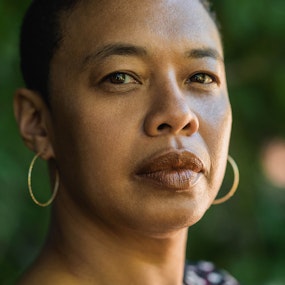
Janet Stickmon
Professor of Ethnic Studies | Wellness Consultant/Coach | Author | Mom
Janet Stickmon is a professor, author, educator trainer, and wellness consultant who has been teaching for 25 years. Stickmon is a professor of Humanities and Ethnic Studies and the founding program coordinator of the Cultural Center at Napa Valley College. Stickmon is the author of Crushing Soft Rubies—A Memoir, Midnight Peaches, Two O’clock Patience—A Collection of Essays, Poems, and Short Stories on Womanhood and the Spirit, and To Black Parents Visiting Earth: Raising Black Children in the 21st Century. Stickmon’s articles are featured in The Huffington Post, Mutha Magazine, Read to Write Stories, Positively Filipino, and Red and Yellow, Black and Brown: Decentering Whiteness in Mixed Race Studies. Her essay “Blackapina” has been featured in a number of publications. Stickmon has 25 years experience practicing meditation and integrating meditative practices throughout all her courses. Janet Stickmon is the founder of CenterJoyPWR®: Strategies for Healing Racial Battle Fatigue—an online experience for professionals of color who want to center joy in their lives. Stickmon has a Master’s Degree in Ethnic Studies from San Francisco State University, a Master’s Degree in Religion and Society from the Graduate Theological Union, Berkeley, and a Bachelor of Science Degree in Civil Engineering from University of California, Irvine. Stickmon also holds a Certificate of Completion for Michael Bernard Beckwith's Life Visioning Mastery program and is currently working toward becoming a National Academy of Sports Medicine (NASM) certified personal trainer.
New to The Exit Interview: A Podcast for Black Educators?
Here are some great episodes to start with.

















